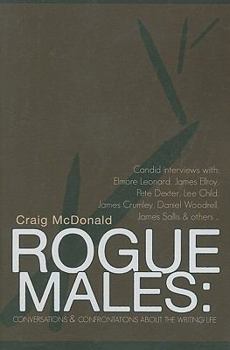Rogue Males: Conversations & Confrontations about the Writing Life
Select Format
Select Condition 
Book Overview
In 2006, Craig McDonald published Art in the Blood, a collection of probing, long-form interviews with 20 major crime writers that was immediately hailed as a definitive text in the study of modern... This description may be from another edition of this product.
Format:Paperback
Language:English
ISBN:1932557458
ISBN13:9781932557459
Release Date:May 2009
Publisher:Bleak House Books
Length:305 Pages
Weight:0.50 lbs.
Dimensions:0.7" x 5.4" x 8.4"
Customer Reviews
1 rating
A sampler of why stories matter
Published by Thriftbooks.com User , 14 years ago
Often, those who are not writers can be bored stiff at the idea of reading what writers think about their craft. Thanks to the writers chosen by Craig McDonald to talk about their work, ROGUE MALES is instead a treasure of what makes fiction -- especially crime fiction -- matter. Whether it's James Ellroy talking about his tortured past and plans of future greatness (just before he decided not to give interviews any more), Max Allan Collins and Stephen J. Cannell being honest about scriptwriting, the late James Crumley discussing writers he admires or Tom Russell telling why music matters, ROGUE MALES is filled with riveting people giving honest views on what matters to them when it comes to writing and, through those revelations, what matters in life. The talk about the writing itself remains center stage and is fascinating. Two of the common threads are how the development of characters makes genre writing all the stronger, and how genre doesn't need to be boxed in. For Crumley, McDonald notes how plot takes second place to character. The great Daniel Woodrell has a writer character of his mention that, while others call him a crime writer, he thinks he's writing slice of life dramas. Woodrell also tells that going to the Iowa Writers Workshop was of great benefit to him, because he paid attention to the writing that the others there admired. Being open to look at all manner of things was helpful to him. Character also is important to veteran scriptwriter and novelist Stephen J. Cannell, who thinks that even if a character appears for only two pages in a script, that character "has to have a yesterday and is going to have a tomorrow" for the script to work. Craig Holden relates that his French editor says the story comes from characters following their urges or obsessions. James Sallis comes across as one of the most thoughtful and perceptive writers around in both solo conversations and one with Ken Bruen. Perhaps it's partly because he has lived in so many ways. His experience includes a career as a respiratory therapist (including for severely ill infants), besides writing poetry and a biography of Chester Himes, translating work from the French and editing anthologies. The entire book is worth buying just for his description of how he could begin a piece by a picture that has come to mind, which he says is how his work often begins, and the questions he asks about that visual image in his head. So is his view of why show, not tell, makes for subtle and powerful storytelling. So are his ideas about rewrites and what that first draft does -- in summary, the writer looks at the draft, asks what the draft is trying to say, and then rewrites the story to fit what the draft says. Sallis also has a beautiful image of literature, how it's not a sideboard with separate drawers in which, say, mystery is never touched by poetry, but rather a long buffet. Now that's wisdom. To deepen the conversation, Alistair Macleod says that writing is an act




